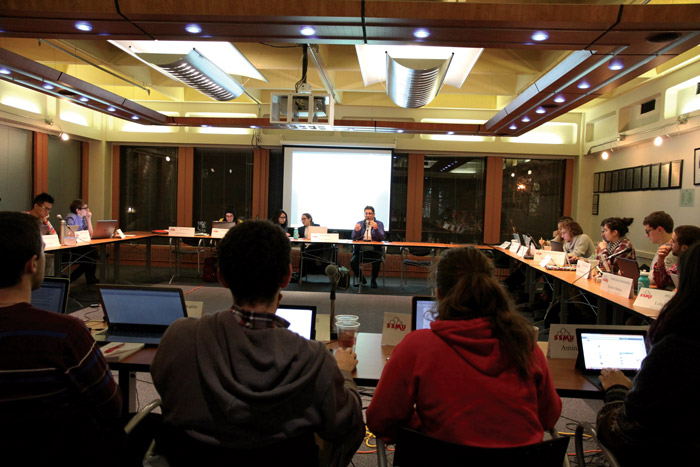Senate addresses budget cuts
McGill Principal Suzanne Fortier addressed various concerns regarding the impact of provincial budget cuts on the university’s budget and services at last Wednesday’s Senate meeting. The Quebec government announced in the middle of November that $4.8 million would be cut from McGill’s budget, in addition to the original $15 million cut announced at the end of this summer.
“Obviously it is very hard for us to absorb these cuts, particularly as we’re more than halfway through our financial year,” Fortier said. “The government is also projecting cuts for next year. This is all in trying to achieve a balanced budget in two years from now.”
The Students’ Society of McGill University’s (SSMU) VP University Affairs Claire Stewart-Kanigan and Arts Senator Jacob Greenspon raised a question asking which particular services would be cut or reduced, which was answered by Provost Anthony C. Masi in an official Senate document.
“Austerity is not a strategy for the longer term, but at the present time McGill will have to adopt certain efficiency measures,” Masi wrote. “While we are exploring our options, the University has not targeted specific student services for elimination as a way of reducing costs. However, some services may have to be offered at a reduced level and all services will have to be studied.”
Masi, whose office is responsible for budget issues, was not present at the meeting to further answer any of the Senators’ questions during the open discussion period. Fortier answered supplemental questions in his absence.
“There will be consultation with the students on any of the services currently offered that might be affected by the cuts,” Fortier said. “As far as I know, there is no plan to eliminate services. The level of service may be affected, but we’re not yet at this level of detail in our analysis of the impact of these cuts.”
Fortier did not say when these student consultations might take place.
Open discussion on learning outside the classroom
The Senate held a discussion on undergraduate research opportunities as the first of many upcoming sessions on learning opportunities outside of the classroom. The main concern in this discussion was whether or not research should be credited, paid, or given other recognition.
One key issue in the discussion concerned how students can use their undergraduate research to further their goals, whether for graduate school, a career, in a competitive market.
“[Students] want credentials to reflect their activities,” Dean of Students André Costopoulos said. “I think in that case, then they are responding to a real-world pressure.”
SSMU President Courtney Ayukawa said she supported undergraduate research to be both credited and paid to increase financial equity.
“I do not want any […] students […] to not be able to do research opportunities they may be incredibly passionate about—with some of the best professors and researchers in the world—because they cannot afford to,” Ayukawa said.
Not all senators shared Ayukawa’s sentiment that a university should be supporting outside endeavours such as research or internships.
“I think it’s important to realize that maybe not everything, not all learning should be credited by the university,” Faculty of Arts Senator Professor Catherine Lu said. “You get a specific kind of education by coming to a university, and that’s supposed to help give you certain foundational resources for working or doing research outside the university.”







